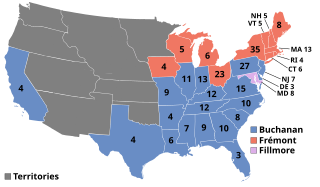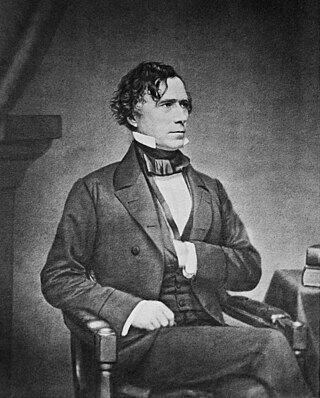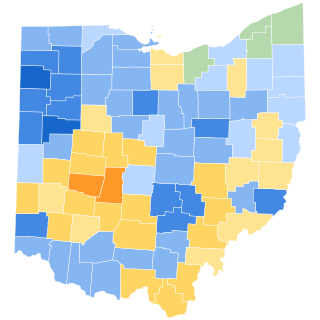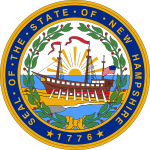
The 1848 United States presidential election was the 16th quadrennial presidential election, held on Tuesday, November 7, 1848. In the aftermath of the Mexican–American War, General Zachary Taylor of the Whig Party defeated Senator Lewis Cass of the Democratic Party.

The 1852 United States presidential election was the 17th quadrennial presidential election, held on Tuesday, November 2, 1852. Democrat Franklin Pierce defeated Whig nominee General Winfield Scott. A third party candidate from the Free Soil party, John P. Hale, also ran and came in third place, but got no electoral votes.

The 1856 United States presidential election was the 18th quadrennial presidential election, held on Tuesday, November 4, 1856. In a three-way election, Democrat James Buchanan defeated Republican nominee John C. Frémont and Know Nothing nominee Millard Fillmore. The main issue was the expansion of slavery as facilitated by the Kansas–Nebraska Act of 1854. Buchanan defeated President Franklin Pierce at the 1856 Democratic National Convention for the nomination. Pierce had become widely unpopular in the North because of his support for the pro-slavery faction in the ongoing civil war in territorial Kansas, and Buchanan, a former Secretary of State, had avoided the divisive debates over the Kansas–Nebraska Act by being in Europe as the Ambassador to the United Kingdom.

John Parker Hale was an American politician and lawyer from New Hampshire. He served in the United States House of Representatives from 1843 to 1845 and in the United States Senate from 1847 to 1853 and again from 1855 to 1865. He began his Congressional career as a Democrat, but helped establish the anti-slavery Free Soil Party and eventually joined the Republican Party.

Franklin Pierce was an American politician who served as the 14th president of the United States from 1853 to 1857. A northern Democrat who believed that the abolitionist movement was a fundamental threat to the nation's unity, he alienated anti-slavery groups by signing the Kansas–Nebraska Act and enforcing the Fugitive Slave Act. Conflict between North and South continued after Pierce's presidency, and, after Abraham Lincoln was elected president in 1860, the Southern states seceded, resulting in the American Civil War.

The 1852–53 United States Senate elections were held on various dates in various states, coinciding with the 1852 presidential election. As these U.S. Senate elections were prior to the ratification of the Seventeenth Amendment in 1913, senators were chosen by state legislatures. Senators were elected over a wide range of time throughout 1852 and 1853, and a seat may have been filled months late or remained vacant due to legislative deadlock. In these elections, terms were up for the senators in Class 2.

The 1964 United States presidential election in New Hampshire took place on November 5, 1964, as part of the 1964 United States presidential election, which was held throughout all 50 states and D.C. Voters chose four representatives, or electors to the Electoral College, who voted for president and vice president.

The 1852 United States elections elected the members of the 33rd United States Congress. The election marked the end of the Second Party System, as the Whig Party ceased to function as a national party following this election. Democrats won the presidency and retained control of both houses of Congress.

The 1852 United States presidential election in Vermont took place on November 2, 1852, as part of the 1852 United States presidential election. Voters chose five representatives, or electors to the Electoral College, who voted for President and Vice President.

The 1912 United States presidential election in New Hampshire took place on November 5, 1912, as part of the 1912 United States presidential election which was held throughout all contemporary 48 states. Voters chose four representatives, or electors to the Electoral College, who voted for president and vice president.

The 1852 United States presidential election in Connecticut took place on November 2, 1852, as part of the 1852 United States presidential election. Voters chose six representatives, or electors to the Electoral College, who voted for President and Vice President.

The 1852 United States presidential election in Maine took place on November 2, 1852, as part of the 1852 United States presidential election. Voters chose eight representatives, or electors to the Electoral College, who voted for President and Vice President.

The 1852 United States presidential election in Rhode Island took place on November 2, 1852, as part of the 1852 United States presidential election. Voters chose four representatives, or electors to the Electoral College, who voted for President and Vice President.

The 1912 United States presidential election in Maine took place on November 5, 1912, as part of the 1912 United States presidential election which was held throughout all contemporary 48 states. Voters chose six representatives, or electors to the Electoral College, who voted for president and vice president. Maine was won by the Democratic nominees, New Jersey Governor Woodrow Wilson and Indiana Governor Thomas R. Marshall. Wilson and Marshall defeated incumbent President William Howard Taft, and his running mate Vice President James S. Sherman and Progressive Party candidates, former President Theodore Roosevelt and his running mate California Governor Hiram Johnson.

The 1964 United States presidential election in Maine took place on November 3, 1964, as part of the 1964 United States presidential election, which was held throughout all fifty states and D.C. Voters chose four representatives, or electors to the Electoral College, who voted for president and vice president.

The 1852 United States presidential election in New York took place on November 2, 1852, as part of the 1852 United States presidential election. Voters chose 35 representatives, or electors to the Electoral College, who voted for president and vice president.

The 1852 United States presidential election in New Jersey took place on November 2, 1852, as part of the 1852 United States presidential election. Voters chose seven representatives, or electors to the Electoral College, who voted for President and Vice President.

The 1852 United States presidential election in Ohio was held on November 2, 1852 as part of the 1852 United States presidential election. State voters chose 23 electors to the Electoral College, who voted for President and Vice President.

The 1852 United States presidential election in Illinois took place on November 2, 1852, as part of the 1852 United States presidential election. Voters chose 11 representatives, or electors to the Electoral College, who voted for President and Vice President.

The 1852 United States presidential election in Michigan took place on November 2, 1852, as part of the 1852 United States presidential election. Voters chose six representatives, or electors to the Electoral College, who voted for President and Vice President.
























